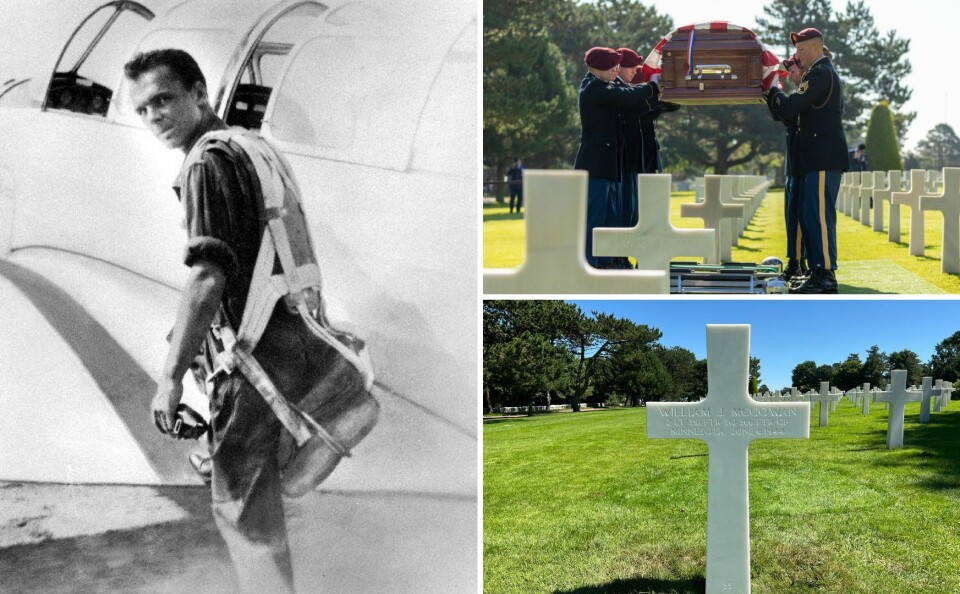-
Trump calls for Marine Le Pen to be freed (but she is not in prison)
US president said her embezzlement court case was a ‘witch hunt’
-
France’s €3 book delivery fee challenged in EU court by Amazon
Online retailer said measure is protectionist and ‘in breach of EU laws’
-
Allergies: How to know pollen levels in your commune of France
Interactive online maps can track and predict how pollen is changing in the air
American D-Day pilot buried with honours in France - 78 years on
Lt. William McGowan was shot down and declared missing - research by family and organisations means he now rests at the Normandy American Cemetery

An American pilot has been formally buried at the Normandy American Cemetery (NOAC) with full military honours 78 years after his plane was shot down on D-Day.
The body of Lieutenant William J. McGowan, from Minnesota, had lain buried in a Normandy field since his death on June 6, 1944.
The 24-year-old’s P-47 Thunderbolt fighter/bomber was hit by anti-aircraft fire and crashed into a field near Moon-sur-Elle, close to Saint-Lô.
No body was found so he was formally declared missing.
Niece’s research found Lt. McGowan
When his niece talked to locals on a visit, she discovered that the plane had crashed in a different field where the body of an unknown pilot was known to lie buried.
His remains were dug up and he was given a burial in July.
Flew three missions that day
Scott Desjardins, superintendent of the NOAC in Colleville-sur-Mer, said Lt. McGowan had wanted to be a pilot as a boy.
“He enrolled at the state military academy when he was 14, and learnt to fly. When war broke out, he joined as a commissioned officer. He was 24 and married, based in the UK.
“He flew three missions that day: an early morning bombing campaign on the French coast; a second mission in support of the ground invasion; and then later, he flew back to France with orders to halt the movement of an armoured column on the eastern edge of the battle area.
“When he got there, the column had changed direction so, following orders for a secondary target, he attacked a railway station and was shot down.”
No body found at ‘official’ crash site
Witnesses reported the site of the crash and said the plane had smashed deep into the earth and the wreck burned all day.
However, since no remains were found, Lt. McGowan, a member of the 391st Fighter Squadron, 366th Fighter Group, 9th US Air Force, was classified as missing in action.
After the war, his niece came to France to visit the Meuse-Argonne American Cemetery where another relative is buried: Lt. McGowan’s soldier uncle, who died in World War One.
She visited the area where the plane was officially said to have crashed but found it was not accurate.
Memorial had been built on true resting place
Talking to local people, she established the exact site of the crash and found that a memorial had been built to honour the unknown pilot.
“She told the US authorities and her mother – William’s sister. We offered to recover and rebury the remains or repatriate them free of charge to the US but she declined.
“In her view, her brother was no longer missing. She knew where he was and was content to leave him in peace.”
When William’s sister died in 2018, however, the family became concerned about the future.
“The owner of the land had always cared for the crash site but who knew who might buy it?
“They requested a dig and the soldier’s remains and parts of his plane were disinterred.”
Organisations help find, identify and honour the fallen
Credible information about crashes is used to research events and, where there is enough evidence, a dig is organised.
Much of the work is identifying remains which were buried in war graves as unknown soldiers.
According to NOAC, there are 307 unknown soldiers in the cemetery, with 1,557 on the missing list. Lt. McGowan was number 20 on that list.
Many of the unknowns were lost at sea on June 6, 1944.
Any remains recovered are transferred to the Defense Accounting Agency in the US for forensic examination.
The NOAC is overseen by the American Battle Monuments Commission (ABMC), a government agency which creates and maintains memorial sites, offers commemorative services, and educates future generations of their legacy.
‘You are not forgotten’
Lt. McGowan’s nephew, speaking on behalf of the family, said they were unanimous in choosing a burial in France.
“He will be laid to rest alongside 9,386 brothers and sisters who also gave the ultimate sacrifice, while in uniform, in service to their country.
“Thank you to the ABMC for allowing one more amazing young man to join these other extraordinary men and women at this beautiful memorial. You are not forgotten.”
Related articles
Black US D-Day veteran awarded France’s highest honour aged 100
D-Day: French archaeologists launch research ahead of 78th anniversary
New film to honour Canadian D-Day soldiers who died freeing French
























